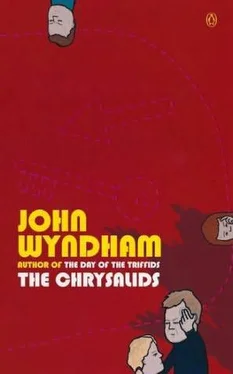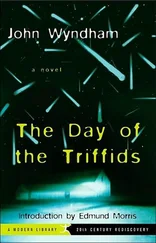‘Oh, it is hurting so,’ she said. She could not hold back the tears any longer. They ran down her face. But even then she didn’t howl: she made small puppyish noises.
‘You’ll have to take it off,’ I told her.
‘No!’ she protested again. ‘No, I mustn’t. Not ever. I mustn’t.’
I sat down beside her, at a loss. Both her hands held on to one of mine, gripping it tightly while she cried. Clearly the pain of her foot was increasing. For almost the first time in my life I found myself in charge of a situation which needed a decision. I made it.
‘It’s no good. You’ve got to get it off,’ I told her. ‘If you don’t, you’ll probably stay here and die, I expect.’
She did not give in at once, but at last she consented. She watched apprehensively while I cut the lace. Then she said:
‘Go away! You mustn’t look.’
I hesitated, but childhood is a time thickly beset with incomprehensible, though important, conventions, so I withdrew a few yards and turned my back. I heard her breathing hard. Then she was crying again. I turned round.
‘I can’t,’ she said, looking at me fearfully through her tears, so I knelt down to see what I could do about it.
‘You mustn’t ever tell,’ she said. ‘Never, never! Promise?’
I promised.
She was very brave. Nothing more than the puppy noises.
When I did succeed in getting the foot free, it looked queer: I mean, it was all twisted and puffy - I didn’t even notice then that it had more than the usual number of toes….
I managed to hammer the shoe out of the cleft, and handed it to her. But she found she could not put it on her swollen foot. Nor could she put the foot to the ground. I thought I might carry her on my back, but she was heavier than I expected, and it was clear that we should not get far like that.
‘I’ll have to go and fetch somebody to help,’ I told her.
‘No. I’ll crawl,’ she said.
I walked beside her, carrying the shoe, and feeling useless. She kept going gamely for a surprisingly long way, but she had to give it up. Her trousers were worn through at the knees, and the knees themselves were sore and bleeding. I had never known anyone, boy or girl, who would have kept on till that pitch; it awed me slightly. I helped her to stand up on her sound foot, and steadied her while she pointed out where her home was, and the trickle of smoke that marked it. When I looked back she was on all fours again, disappearing into the bushes.
I found the house without much difficulty, and knocked, a little nervously. A tall woman answered. She had a fine, handsome face with large bright eyes. Her dress was russet and a little shorter than those most of the women at home wore, but it carried the conventional cross, from neck to hem and breast to breast, in a green that matched the scarf on her head.
‘Are you Sophie’s mother?’ I asked.
She looked at me sharply and frowned. She said, with anxious abruptness:
‘What is it?’
I told her.
‘Oh!’ she exclaimed. ‘Her foot!’
She looked hard at me again for a moment, then she leant the broom she was holding against the wall, and asked briskly:
‘Where is she?’
I led her by the way I had come. At the sound of her voice Sophie crawled out of the bushes.
Her mother looked at the swollen, misshapen foot and the bleeding knees.
‘Oh, my poor darling!’ she said, holding her and kissing her. Then she added: ‘He’s seen it?’
‘Yes,’ Sophie told her. ‘I’m sorry, Mummy. I tried hard, but I couldn’t do it myself, and it did hurt so.’
Her mother nodded slowly. She sighed.
‘Oh, well, it can’t be helped now. Up you get.’
Sophie climbed on to her mother’s back, and we all went back to the house together.
The commandments and precepts one learns as a child can be remembered by rote, but they mean little until there is example — and, even then, the example needs to be recognized.
Thus, I was able to sit patiently and watch the hurt foot being washed, cold-poulticed, and bound up, and perceive no connexion between it and the affirmation which I had heard almost every Sunday of my life.
‘And God created man in His own image. And God decreed that man should have one body, one head, two arms and two legs: that each arm should be jointed in two places and end in one hand: that each hand should have four fingers and one thumb: that each finger should bear a flat finger-nail…’
And so on until:
‘Then God created woman, also, and in the same image, but with these differences, according to her nature: her voice should be of higher pitch than man’s: she should grow no beard: she should have two breasts…’
And so on again.
I knew it all, word for word — and yet the sight of Sophie’s six toes stirred nothing in my memory. I saw the foot resting in her mother’s lap. Watched her mother pause to look down at it for a still moment, lift it, bend to kiss it gently, and then look up with tears in her eyes. I felt sorry for her distress, and for Sophie, and for the hurt foot — but nothing more.
While the bandaging was finished I looked round the room curiously. The house was a great deal smaller than my home, a cottage, in fact, but I liked it better. It felt friendly. And although Sophie’s mother was anxious and worried she did not give me the feeling that I was the one regrettable and unreliable factor in an otherwise orderly life, the way most people did at home. And the room itself seemed to me the better, too, for not having groups of words hanging on the wall for people to point to in disapproval. Instead, this room had several drawings of horses, which I thought very fine.
Presently, Sophie, tidied up now, and with the tear-marks washed away, hopped to a chair at the table. Quite restored, but for the foot, she inquired with grave hospitality whether I liked eggs.
Afterwards, Mrs. Wender told me to wait where I was while she carried her upstairs. She returned in a few minutes, and sat down beside me. She took my hand in hers and looked at me seriously for some moments. I could feel her anxiety strongly; though quite why she should be so worried was not, at first, clear to me. I was surprised by her, for there had been no sign before that she could think in that way. I thought back to her, trying to reassure her and show her that she need not be anxious about me, but the thought didn’t reach her. She went on looking at me with her eyes shining, much as Sophie’s had when she was trying not to cry. Her own thoughts were all worry and shapelessness as she kept looking at me. I tried again, but still couldn’t reach them. Then she nodded slowly, and said in words:
‘You’re a good boy, David. You were very kind to Sophie. I want to thank you for that.’
I felt awkward, and looked at my shoes. I couldn’t remember anyone saying before that I was a good boy. I knew no form of response designed to meet such an event.
‘You like Sophie, don’t you?’ she went on, still looking at me.
‘Yes,’ I told her. And I added: ‘I think she’s awfully brave, too. It must have hurt a lot.’
‘Will you keep a secret — an important secret — for her sake?’ she asked.
‘Yes — of course,’ I agreed, but a little uncertain in my tone for not realizing what the secret was.
‘You — you saw her foot?’ she said, looking steadily into my face. ‘Her — toes?’
I nodded. ‘Yes,’ I said again.
‘Well, that is the secret, David. Nobody else must know about that. You are the only person who does, except her father and me. Nobody else must know. Nobody at all — not ever.’
‘No,’ I agreed, and nodded seriously again.
There was a pause — at least, her voice paused, but her thoughts went on, as if ‘nobody’ and ‘not ever’ were making desolate, unhappy echoes there. Then that changed, and she became tense and fierce and afraid inside. It was no good thinking back to her, so I tried clumsily to emphasize in words that I had meant what I said.
Читать дальше












